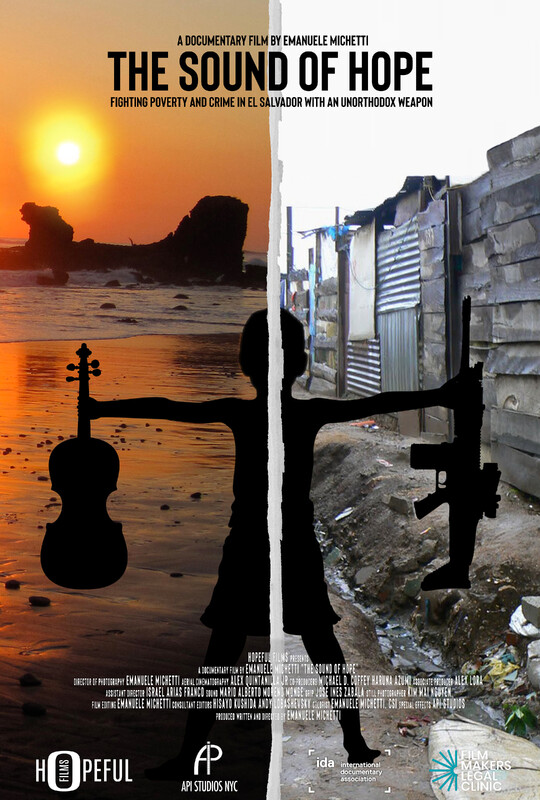The Sound of Hope
Film Screening & Ticket Information
When & Where to See this Film!
ART HEALS: 2 films that will put you back together.
April 20, 2024 @ 11:30AM • Kaufman Astoria Studios – Zukor Theatre
Film Bloc Line Up:
View the Trailer
Synopsis
A diplomat, a teacher, and a musician declare war on poverty, ignorance, and crime, using an unorthodox weapon: classical music education.
Credits
Emanuele Michetti, Director
Emanuele Michetti, Writer
Emanuele Michetti, Producer, Lilly’s Secret, Frammenti, The Blue Sound of New York, Addictions, Yellow Water
Alex Lora, Producer, El cuarto reino, Thy Father’s Chair, Unicorns, The Masterpiece
Michael D. Coffey, Producer, Triumph, Catching Air
Haruna Azumi, Producer
Emanuele Michetti, Editors
Hisayo Kushida, Editors, Ryuichi Sakamoto: CODA, East of Main Street, Doing Business in China
Director Statement
I became interested in documenting how people are helping youth to avoid or escape gang life using classical music. This was a surprising and novel idea to me, considering that most young people don’t know this kind of music, and when they do they don’t enjoy it.
After spending time in El Salvador, I saw how violence eclipses the beauty of this country, which is surrounded by stunning landscapes and is mostly populated by generous and harmless citizens.
As I was filming this documentary, I found myself in a new reality where it was dangerous and ill-advised to walk around with a camera. After convincing the authorities of the importance of shooting outdoor footage, I had a personal guard with a large shotgun assigned to escort me. Even so, I was stopped numerous times and asked to leave to prevent endangering bystanders.
That is everyday life in El Salvador. For everyone.
However, after filming the students and teachers, I realized that there is a social problem in this country that became a crime problem. As long as programs such as El Sistema exist, this situation can change.
Working with at-risk youth through music education in underserved communities is not only a more ethical and non-violent way to create a better society, but it is also much more successful.
History has proven that the “war on drugs” and the use of violence to eradicate gangs and crime have not only failed, but they made the problem worse.
Giving a child or a teenager hope, a goal, and a community through programs such as El Sistema, can change their life for the better, regardless of whether or not they will become musicians. Without this opportunity, these kids might look for a surrogate family in a gang in order to fill the void.
Furthermore, these programs are beneficial for the economy: in El Salvador, the world bank found a 34% reduction in violence among youth that were studying music in this country. Another statistic states that for every dollar spent on violence prevention in programs such as music, $7 are saved due to a decrease in incarcerations.
I grew up in a not very good neighborhood in Italy. As a teenager I often spent time with the wrong people. I was lucky to have had amazing and patient parents, and also a community, who helped me grow up with values and structure. When in El Salvador, I noticed how culturally similar it was to my home country.
However, in El Salvador, this structure is lacking due to an abundance of broken families and absent fathers. Mothers are often too busy to make ends meet and the children are vulnerable and in search of a surrogate family. These programs can provide the community that they are looking for, and an opportunity to get back on the right path. As someone who has been on the wrong path, I realize the importance of mentors who can guide youth at this vulnerable stage in their life.
Director Biography
An award-winning Italian director and filmmaker, Emanuele has produced short narrative films, documentaries, music videos, and video art projects.
Mentored by Chantal Akerman and Antonio Tibaldi, his work focuses on social issues such as mental illness, discrimination, gender equality, and minorities. His stories are mostly about loneliness and alienation in modern times. In most of his films, dialogue is minimal in order to highlight the characters’ isolation and focus on their behavior.
His films have been screened at festivals such as Montreal World Film Festival, Turin Film Festival, and the Academy Award Qualifying Urbanworld Film Festival.
Born and raised in Rome, Italy, he currently resides in New York City.

